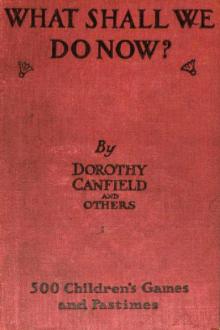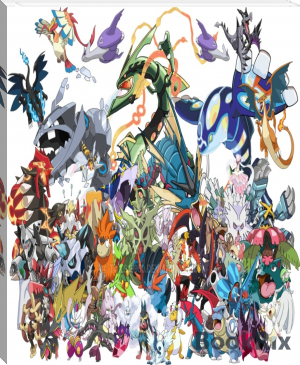What Shall We Do Now?, Dorothy Canfield Fisher [ebook offline reader .txt] 📗

- Author: Dorothy Canfield Fisher
- Performer: -
Book online «What Shall We Do Now?, Dorothy Canfield Fisher [ebook offline reader .txt] 📗». Author Dorothy Canfield Fisher
Being now unable to get any fresh families of small animals, I started a collection of big china animals, and soon had thirty-five, among whom were a Jersey bull and cow, another brown bull and a brown and white cow, two beautiful horses, several dogs, two donkeys, and two goats.
These I kept apart from the small animals, in another cupboard; but I still kept the lion king over them as well, and gave them two big animals, a bloodhound and a St. Bernard, as governors over them.
Among the small animals I had a very learned-looking pig called Orsino, whom I made doctor, while an old bulldog, Dimboona, to whom I had been obliged to give two wooden legs, was Prime Minister. I also had a treasurer, a rent collector, a steward, and an under-steward. I also made a young boar-hound, called Panther, the son of Sir Philip, keeper of the stables, which consisted of ninety-two horses which I had made.
And this brings the narrative of the growth of my china animal collection up to the present time, when I have 555 small animals and 35 big ones, 590 in all.
AT THE SEASIDE AT THE SEASIDE Low TideThe first thing to do on reaching the seaside is to find out when it is low tide. In each twelve hours low tide comes twenty minutes later, and knowing this you can arrange your days accordingly. Nothing is so saddening as to run down the beach in the belief that the tide is going out and to find that it is coming in.
PaddlingTo boys who wear knickerbockers the preparations for paddling are very simple; but girls are not so fortunate. Lewis Carroll (who wrote Alice in Wonderland) took their difficulties so seriously that whenever he went to the seaside to stay he used to have with him a packet of safety-pins for the use of any children that seemed to be in need of them. This piece of thoughtfulness on his part might determine you to carry them for yourselves.
A Cork ShipSailing a good boat in the sea is not the best fun, but there is a kind of boat which is very easily made as you sit on the beach, and which is useful to play with when wading, and afterward to throw stones at. You take a piece of cork for the hull. Cut a line down the middle underneath and wedge a strip of slate in for a keel to keep her steady. Fix a piece of driftwood for a mast, and thread a piece of paper on that for a sail.
Wet ClothesWhen wading it is just as well not to get your clothes wet if you can help it. Clothes that are made wet with seawater, which probably has a little sand in it, are as uncomfortable as crumbs in bed. There is no reason why you should get them wet if you wade wisely. Sitting among the rocks, running through the water, and jumping the little crisping waves are the best ways to get soaked.
RocksSeaside places where there are rocks and a great stretch of sand are the best. Rocks make paddling twice as exciting, because of the interesting things in the little pools—the anemones, and seaweeds, and shells, and crabs, and shrimps, and perhaps little fish. Sometimes these pools are quite hot. To enjoy the rocks properly you want a net.
Sand Castles, and Other Sand GamesTo make full use of the sands a spade is necessary and a pail important. The favorite thing to make is a castle and a moat, and although the water rarely is willing to stay in the moat it is well to pour some in. The castle may also have a wall round it and all kinds of other buildings within the wall. Abbeys are also made, and great houses with carefully arranged gardens, and villages, and churches. Railways with towns and stations here and there along the line are easily made, and there is the fun of being the train when the line is finished. The train is a good thing to be, because the same person is usually engineer and conductor as well. Collisions are interesting now and then. The disadvantage of a railway on crowded sands is that passers-by injure the line and sometimes destroy, by a movement of the foot, a whole terminus; it is therefore better at small watering-places that few people have yet discovered. If an active game is wanted as well as mere digging and building, a sand fort is the best thing to make, because then it has to be held and besieged, and perhaps captured. In all sand operations stones are useful to mark boundaries.
Burying one another in the sand is good at the time, but gritty afterward.
SeaweedSeaweed and shells make good collections, but there is no use in carrying live fish home in pails. The fun is in catching the fish, not is keeping it; and some landladies dislike having the bath-room used as an aquarium. On wet days seaweed can be stuck on cards or in a book. The best way to get it to spread out and not crease on a card, is to float the little pieces in a basin and slip the card underneath them in the water. When the seaweed has settled on it, take the card out and leave it to dry. The seaweed will then be found to be stuck, except perhaps in places here and there, which can be made sure by inserting a little touch of gum. It is the smaller, colored kinds of seaweed that one treats in this way; and it is well to leave them for a day in the sun before washing and preparing, as this brings out their color. The ordinary large kind of seaweed is useful as a barometer. A piece hung by the door will tell when rain is coming by growing moist and soft.
Shell WorkA good use for little shells is to cover small boxes with them. The shells are arranged in a simple pattern and fastened on with glue. If the shells are not empty and clean, boil them, and scrub them with an old tooth-brush.
Good Seaside FriendsSo many interesting things are to be seen at the seaside that there is no need to be always at play. Fishermen will come in with their boats, which need pulling up; or a net that has been dropped near the shore will be drawn in from the beach, and you can perhaps help. If the town is not merely a watering-place but also a seaport, it is, of course, better, because then there will be the life of the harbor to watch. To be friends with a lighthouse man is almost as good a thing as can happen; and if there is both a lighthouse and a shipbuilder's you could hardly be more fortunate.
IN THE COUNTRY IN THE COUNTRYThis chapter has been written more for readers who live in a town and visit the country only during the holidays than for those whose home is always there. Regular country dwellers do not need to be told many of the things that follow; but none the less there may be a few to find them useful. The principal special attractions of the country are—
In the spring Birds' nests. " June Bee-swarming and hay-making. " July Sheep-washing and shearing. " August Early windfalls and harvest. " September Blackberries, nuts, hops, mushrooms, and squirrels. Making FriendsThe most important thing to do when staying at a farmhouse is to make friends with the principal people. The principal people are those in charge of the chickens and ducks, the cows and the horses. The way to make friends is to be as little trouble as possible.
ExplorationOn reaching the farm, it is well to make a journey of discovery, in order to learn where everything is. The more one knows about the things in store—the size of the barn, the height of the haystacks, the number of horses, the name of the watch-dog, the position and character of the pond, and so forth—the simpler will it be, on going to bed, to make plans for the visit.
Finding Hens' EggsThe farmer's wife usually has charge of the chickens and ducks, but very often it is her daughter or a servant. No matter who it is, as soon as she is convinced that you will be careful and thorough she will let you hunt for eggs. This is very exciting, because hens have a way of laying in nests in the wood and all kinds of odd places, hoping that no one will find them and they will thus be able to sit and hatch out their chickens. The hay in the stable is a favorite spot, and under the wood-pile, and among the long grass. Sometimes one overlooks a nest for nearly a week and then finds three or four eggs in it, one of them quite warm. This is a great discovery. Just at first it is easy to be taken in by the china nest-eggs, and to run indoors in triumph with one in your hand. But the farmer's wife will laugh and send you back with it, and the mistake is not likely to be made again. After a while one gets to know the hens personally, and to know the noise which means that they have just laid. Sometimes, if a hen is going to lay just as you come to her nest, she will run off clucking and screaming and lay the egg on the ground.
Ducks' EggsDucks' eggs, which are rather larger than hens' eggs, and pale green in color, are often more difficult to find. They have to be hunted for in the grass by the pond.
Feeding the ChickensThe farmer's wife also lets her visitors feed the chickens if they are gentle with them and thoughtful. It needs quite a little thought, because if you throw down the grain without thinking, many of the weaker and less greedy ones will get nothing, and many of the stronger and greedier ones will get too much. After a few handfuls you can see which are the weaklings, and after that you can favor them accordingly. A greedy hen is so very greedy that she will always, whatever you do, get more than her share; but it is possible to snub her a little. The very little chickens and ducklings do not have grain, but soft food, which is put in a saucer and placed inside the coop. It is after they have finished eating that they can most easily be picked up, but one must be very careful not to squeeze them.
The DairyIf the farmer's wife makes her own butter there will be an opportunity to help her. Perhaps she will let you use the skimmer. Turning the churn is not much fun except just when the butter forms.
Bee-SwarmingBees swarm on hot days in the early summer, usually in a tree, but sometimes in a room, if the window is open, and often in a bush, quite close to the ground. When they swarm in a tree you would think a black snow-storm was raging all around it. Every moment the cluster of bees grows larger and larger, until, after half an hour or so, it is quiet. Then the swarm has to be taken. This is





Comments (0)